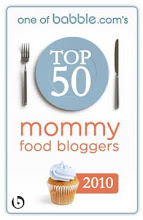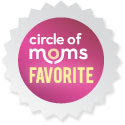
We all want what's best for our family and by now, most of us should know that feeding them food without harmful chemicals is the way to go. However, with economic times such as these, when it's hard enough to pay for the roof over your head, the thought of paying $3.00 (I'm exaggerating) for one organic apple can be really scary. I wanted to post a little info for all of my friends who feel they can’t afford to buy organic. Hope this info is helpful and enables you to make educated decisions when grocery shopping for your family.
Organic? What’s it all about?
Organic products are products that have not been contaminated with potentially harmful chemicals during the processing of that item.
There are different categories for organic foods and I found some easy definitions from Slashfood:
(info taken directly from Slashfood)
- 100% Organic- means that every ingredient in the product was raised and harvested in an organic environment as approved and certified by the USDA.
- Organic- means that 70 to 95 percent of all the ingredients have been raised in a USDA approved manner
- Any product containing ingredients with less than a 70 percent organic content can separately list each ingredient that falls into the USDA organic category, but the product may not display a label claiming the product as organic.
Why is it important for my family to eat organically?
There are many reasons why organic is better both socially and environmentally.
Just to name a few:
• No pesticide, herbicide, fungicide residues on food.
• Less chlorine released into our environment.
• No genetically engineered organisms or varieties.
• Intense, real flavors.
• Higher vitamin and mineral content.
The Question:
So what does one do when she wants to provide the freshest, healthiest ingredients for her family?
The Answer:
You do the best you can with what you can. When I was pregnant I made the change to mostly organic food. Dairy and produce are items that I always buy organic without exception. In my opinion, if we have to make a choice, we should spend the most money on the things that go into our bodies and spend less on the things that decorate the outside of our bodies. Organic products are higher in price and therefore many people treat them as a luxury item. Don’t get me wrong, it’s really fun to walk around with a new dress or new shoes but it’s even better to walk around with a strong, healthy, nourished body! Come on people, pesticide-free is the new black! LOL (I crack me up!) Seriously, even if you can't afford to purchase all organic products, just purchasing some will make a huge difference. Remember, small changes can make a HUGE impact especially when it comes to your health!
The Game Plan
If you cannot afford to buy everything organic and money is tight (I hear ya!), use these tips as your guide when grocery shopping. Before you know it, you and your family will be living a healthier lifestyle.
Tips:

1. Chose your supermarkets wisely
Trader Joe's and Stop and Shop are two of my favorite places to buy organic products. They sell their organic products cheaper than most other places. When I started making all of Griffin’s baby food, I stocked up on organic fruits and veggies at Trader Joe's.
Stop and Shop has its own organic house brand, called Nature’s Promise. There are some great products to be found at these stores and they are considerably cheaper than at a market like Whole Foods (although even Whole Foods has a house brand called 365 that has a less expensive organic line as well.).
2. Buy Frozen
Many organic fruits and veggies can be purchased frozen, which is often cheaper than fresh ( Cascadian Farms is a fave brand of ours). It’s also great to have a bunch of frozen fruits and veggies on hand for a quick stir-fry or smoothies. Fruits and veggies don’t stay around too long in our house but if you are worried about your produce going bad, buying frozen will eliminate waste. Fresh is best but frozen veggies are also really healthy and a great alternate option.
3. Avoid the “Dirty Dozen”
When buying produce, use the guide below to decide which items are more important to purchase organically grown. This information is taken from the Environmental Working Group website (http://www.ewg.org/)
Dirty Dozen
12 Most Contaminated—Buy These Organic
• Apples
• Bell Peppers
• Celery
• Cherries
• Imported Grapes
• Nectarines
• Peaches
• Pears
• Potatoes
• Red Raspberries
• Spinach
• Strawberries
12 Least Contaminated—buy conventional when short on cash
• Asparagus
• Avocados
• Bananas
• Broccoli
• Cauliflower
• Corn (sweet)
• Kiwi
• Mangoes
• Onions
• Papaya
• Pineapples
4. Support your local Farmers Market and buy produce that is IN SEASON!
Sure, it sounds great that we can get strawberries year-round but by purchasing local foods in-season, you eliminate the environmental damage caused by shipping foods thousands of miles and your family health will benefit from eating fresh, local produce.
Also, just because a farmer isn’t “Certified Organic”, doesn’t mean that he/she doesn’t grow their products organically. Obtaining a “Certified Organic” certification is very costly and many farmers cannot afford to pay the high fee. Talk to the farmers at your local market and get to know them and their products. Ask them what their growing practices are and create a relationship with them. It’s a wonderful thing when you can actually say you know the person who is supplying your food. It’s quite different to hear it from the source rather than reading a heavily branded “mission” on a fancy package in the supermarket.
A good site about eating locally:
http://www.nrdc.org/health/foodmiles/
You can find organic growers at most farmers’ markets; many of those farmers don’t charge a premium like the stores do. For listings of local farmer’s markets and other sources, go to www.ams.usda.gov/farmersmarkets and www.localharvest.org .
4. Last and certainly not least COUPONS!
My girls over at Chowmama.com ( the fly-est kid-friendly recipe site out there!!) hipped me to this trick just today.
Alexscoupons.com
OrganicCoupons.com
Bottom Line
The cost of buying organic is higher than buying conventional products but the cost to the health of our family if you don’t may be far greater. Make the investment in your health and your family’s health. It will be the best money you ever spend.
Books
These books are a must read if you are super interested in food and where real food comes from. They are great go-to books and are indispensable to any foodie household.
What to Eat? By Marion Nestle
In Defense of Food By Michael Pollan
The Omnivore's Dilemma By Michael Pollan







No comments:
Post a Comment